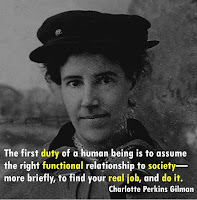 |
| At one point, idealistic Jeff praises the |
| women for cooperating like "bees." My Terry |
| points out that a queen bee kills other queens. |
| Pollyanna with attitude. |
One of the major problems with utopias is that they are invented by people who don't understand grunt work or specialization.
Like many utopia builders, Charlotte Perkins Gilman resided in the class that could be termed "white collar."
She wasn't as wealthy as her relations, the Beechers. She wasn't as poor as the Alcotts. And she did her own share of grunt work to pay the bills. But she never entirely understood it.
Many utopia builders don't.
Grunt Work
But it was work she liked, not work she loathed--namely, it wasn't the boring, niggling, not so interesting stuff that must get done at some point. When people "helpfully" suggest ways for me to care for my elderly parents, I usually roll my eyes. Like utopia builders, their ideas are full of sweetness and light. In truth, 60% of caring for my elderly parents isn't coming up with clever ideas. It's sitting on the phone, waiting to badger someone. And filling out paperwork. And cleaning up messes.
When More argues that members of his Utopia only have to work 6 hours a day (aside from the two years when they go off to be farmers), he is ignoring that daily grind--the reality that nothing in an urban environment can be sustained without someone filling the potholes and shoveling up the horse droppings. In Lost Horizon, Shangri-la is presented as entirely beautiful and modern--the baths are from Ohio (seriously)--while the well-paid "porters" are credited for the items' arrival. Nobody explains how exactly heavy-duty construction materials, such as pipes, and other items could be carted in over the treacherous passes without (1) numerous porters dying; (2) a major commercial interest noticing.
And who is putting in all the stuff when it arrives? Are those workers doing the grinding, dusty, dirty work for the good of the other residents? Because they (conveniently) enjoy grinding, dusty, dirty work? They actually might. But it's not the kind of work that can be started and then stopped (only 6 hours a day!) or performed at a leisurely pace (not without causing more problems--see issues in pouring cement). Which means, a group of somebodies is working quite hard behind the façade of delightful and restful beauty.Roman roads are honored for a reason. Michelangelo's attempt to create decent access to a marble quarry was made for a reason.
As Terry remarks about the roads in Herland:
“This is no sanctuary of females. There have to be men here,” I kept insisting because frankly, laying asphalt is back-breaking work that requires substantial physical endurance.
Van argued later that the women used powered machines. A manufacturing site exists on the western edge of the country (we never got to see it). I doubt the possibility of hard work occurred to Jeff. He certainly didn’t seem troubled by the idea that any group of people, including women, spent arduous hours keeping the road he was praising smooth. In Jeff’s mind, hard labor will never be synonymous with the kind of people Jeff personally knows.
So we walked along the road that Van saw as abstractly detrimental [for environmental reasons], and Jeff saw as wholly beautiful, and I saw as toil.
Someone, Terry points out again and again, is doing a lot of hard work to keep the country clean and functional:
And there were the assumptions [the mentors] presented as givens, ideas to be accepted without skepticism. Such as, We have no aristocracy.
Merely because people aren’t being “paid,” doesn’t mean they aren’t accruing more privileges, more ease than others.
Van argues that the mentors also cleaned and scrubbed. But then Van has no real idea how long it takes to unclog a toilet. Someone else does it for him, just as a whole host of someone elses were maintaining the country’s day-to-day infrastructures while the mentors conversed with us in airy, hygienically clean rooms.
In fairness, Gilman saw grunt work as a specialty. If she had the money (she didn't), she would have willingly paid manual laborers large sums of cash.
Unfortunately, she didn't understand specialization as a lifestyle.
To be continued...
Chapter 6
His in Herland or Astyanax in Hiding




No comments:
Post a Comment